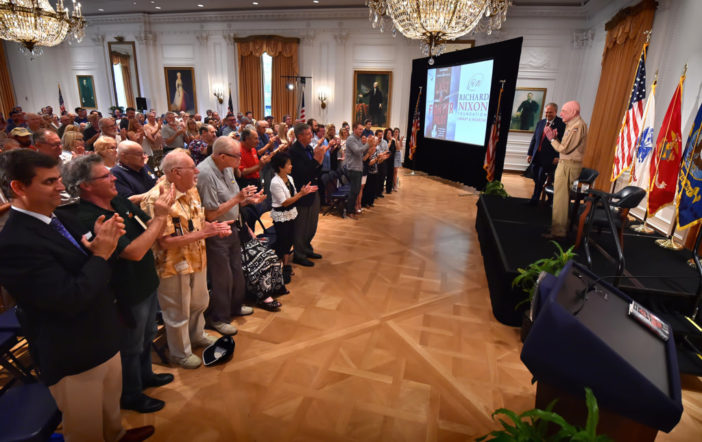His enemies became his friends.
His hatred changed to love.
Capt. Jerry Yellin, a World War II Army Air Corps pilot, recently talked about his transformation in front of a gathering of about 250 in the replicated White House East Room at the Nixon Library in Yorba Linda.
Yellin is tall and slim, and at 93, sports a posture as straight as a ruler.
His wits are as keen as a 20-year-old’s.
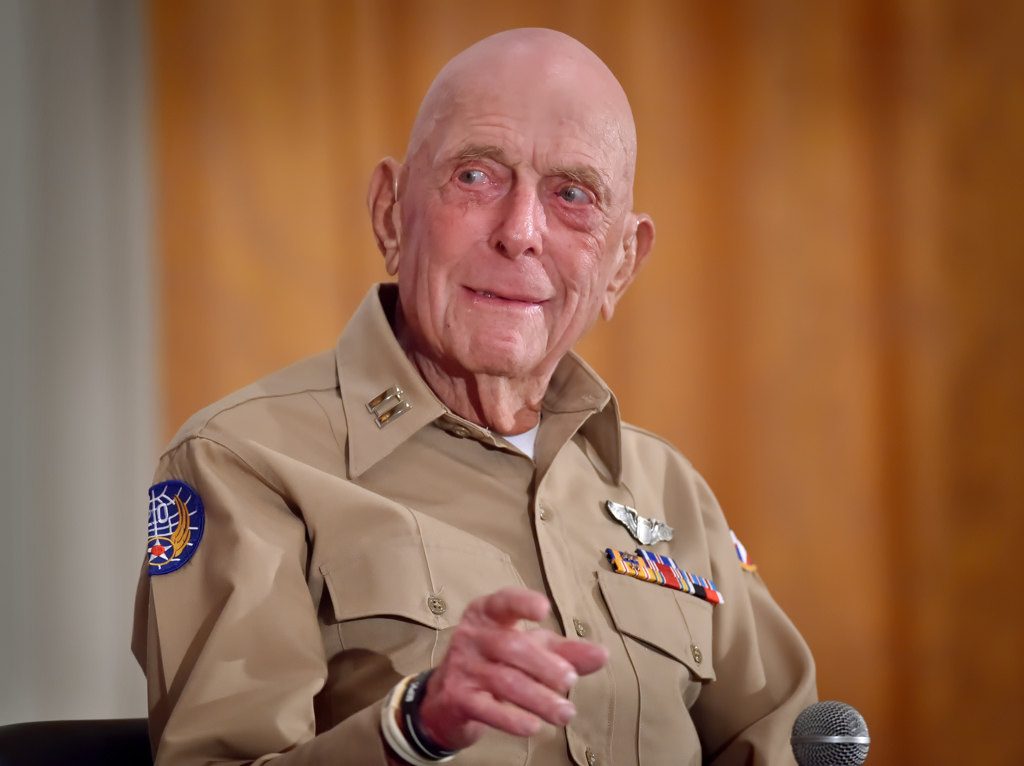
Capt. Jerry Yellin talks about his experiences flying over Japan during World War II and his life after the war.
Photo by Steven Georges/Behind the Badge OC
Wearing a khaki Army Air Corps uniform, Yellin entered the East Room to a standing ovation at the Aug. 3 event.
He sat in a chair on an elevated platform alongside Don Brown, author of the recently released book, “The Last Fighter Pilot: The True Story of the Final Combat Mission of World War II.”
It’s Yellin’s story.
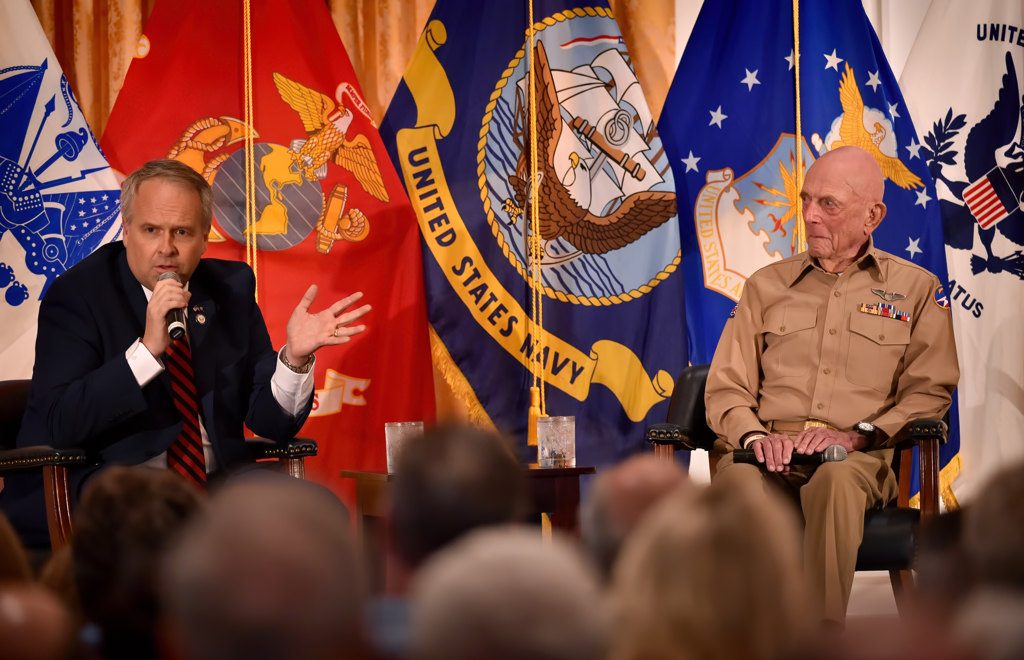
Author Don Brown, left, talks about the book he wrote about WWII Pilot Capt. Jerry Yellin during a lecture at the Nixon Library.
Photo by Steven Georges/Behind the Badge OC
On Aug. 14, 1945, days after the U.S. dropped atomic bombs on Hiroshima and Nagasaki, Yellin flew a bombing mission from Iwo Jima to Japan. By the time he returned to Iwo Jima that day, Japan had officially surrendered and the war was over.
Yellin’s wingman, Phillip Schlamberg, was killed on that mission, making him the final casualty of World War II.
Brown, an attorney and former Naval officer, learned about Yellin when he saw a YouTube video of former pilots being interviewed during an event at Iwo Jima in 2015, commemorating the 70th anniversary of the invasion of that island.
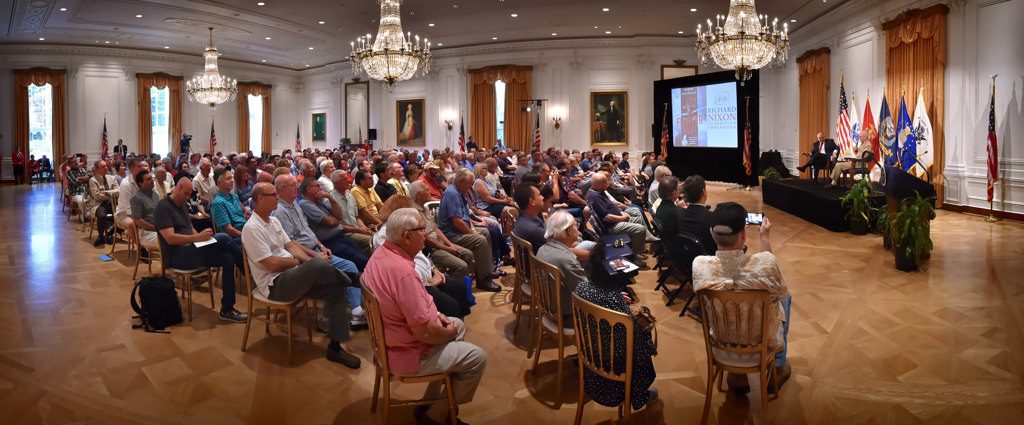
WWII Pilot Capt. Jerry Yellin talks to a crowded room at the Nixon Library with author Don Brown.
Photo by Steven Georges/Behind the Badge OC
“This is a story that had been missing from history for the last 70 years,” Brown said. “It should have been told years ago.”
Yellin told the Nixon Library audience how he enlisted at age 17, three months after the Dec. 7, 1941 bombing of Pearl Harbor.
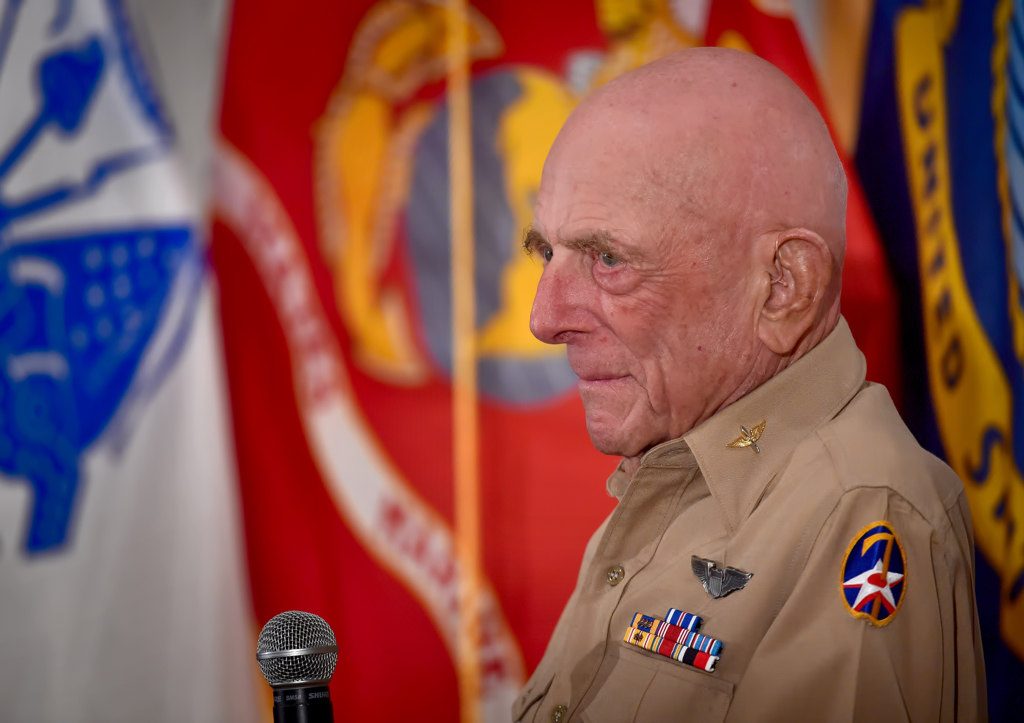
Capt. Jerry Yellin talks about his experiences flying over Japan during World War II and his life after the war.
Photo by Steven Georges/Behind the Badge OC
A New Jersey native, Yellin said he had blocked from his mind the 16 pilots, many his friends, who were killed throughout the 19 bombing missions he flew over Japan as a member of the 78th Fighter Squadron.
“Because if I ever thought of them, I wouldn’t have been able to fly combat missions,” Yellin said.
He vividly recalled seeing thousands of dead Japanese troops.
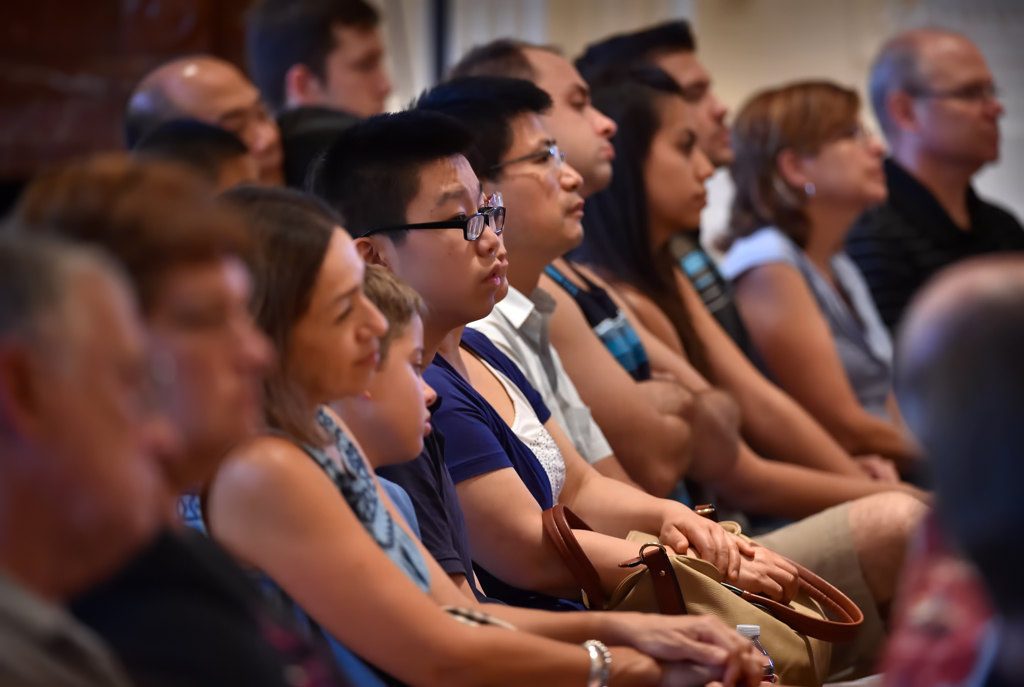
A crowd of people of all ages listens as Capt. Jerry Yellin talks about his experiences over Japan as a World War II pilot.
Photo by Steven Georges/Behind the Badge OC
“You can replicate pictures and replicate sounds but you can never replicate the smell of 28,000 rotting bodies in the sun.”
However, Yellin said he was unfazed by the carnage.
“I never thought of the Japanese as human beings,” he said. “The only Japanese I ever saw were the dead Japanese.”
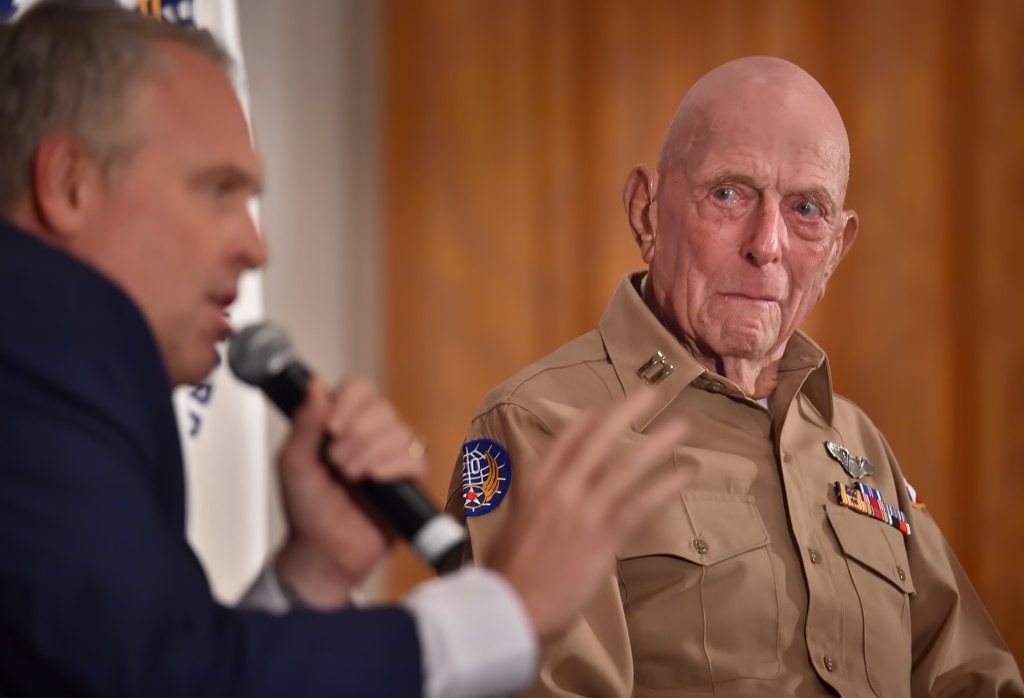
WWII Pilot Capt. Jerry Yellin listens as Don Brown, left, talks about the book he wrote about Yellin.
Photo by Steven Georges/Behind the Badge OC
But, Yellin learned that it’s impossible to be unaffected by the horrors of war.
He suffered from untreated PTSD for three decades and spent years meeting up with other World War vets who anguished and struggled with thoughts of suicide.
“The Army Air Corps had trained me and prepared me to fly combat missions but there was no training on how to fit into society when the war was over and I stopped flying,” he said.
In 1975, Yellin discovered Transcendental Meditation and credits that practice for curing his PTSD.
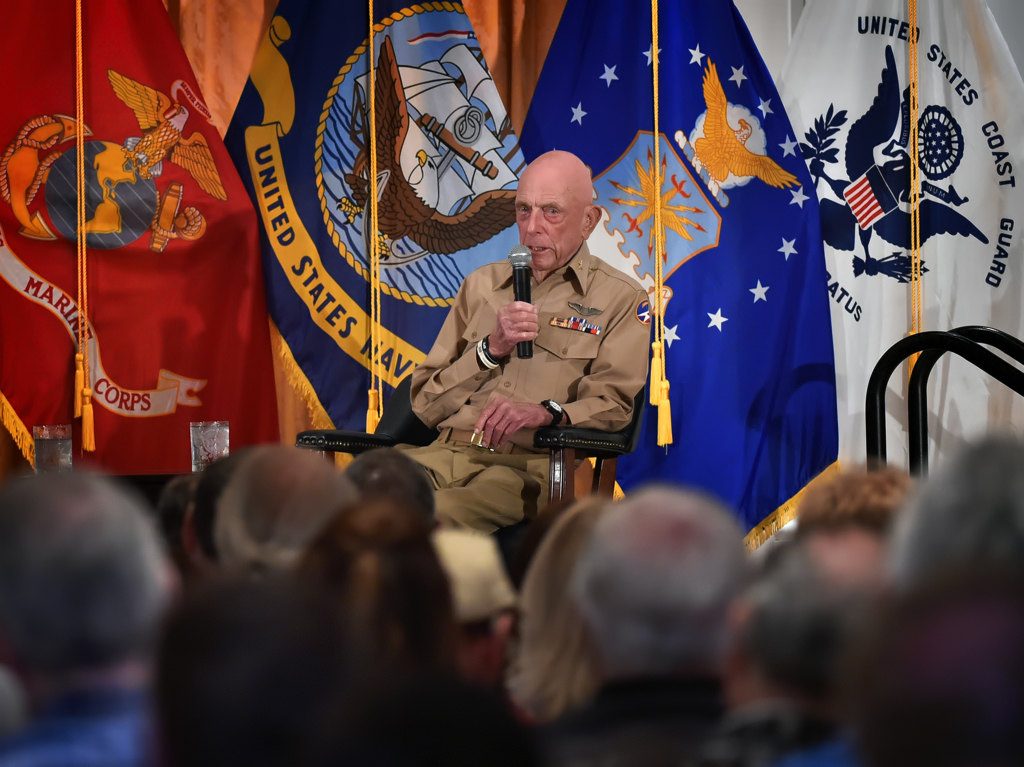
Capt. Jerry Yellin talks about his experiences flying over Japan during World War II and his life after the war.
Photo by Steven Georges/Behind the Badge OC
Yellin worked for Wells Fargo Bank and was living in California in 1983 when he was asked to take a business trip to Japan.
“I had never considered nor did I ever want to go to Japan,” he said.
But his wife did.
So, in October 1983, he returned to Japan for the first time in 38 years.
The experience was transformative.
“I met people who were real people,” Yellin said. “They were well dressed and well-mannered and college educated. The food was stupendous. The scenery was great.”
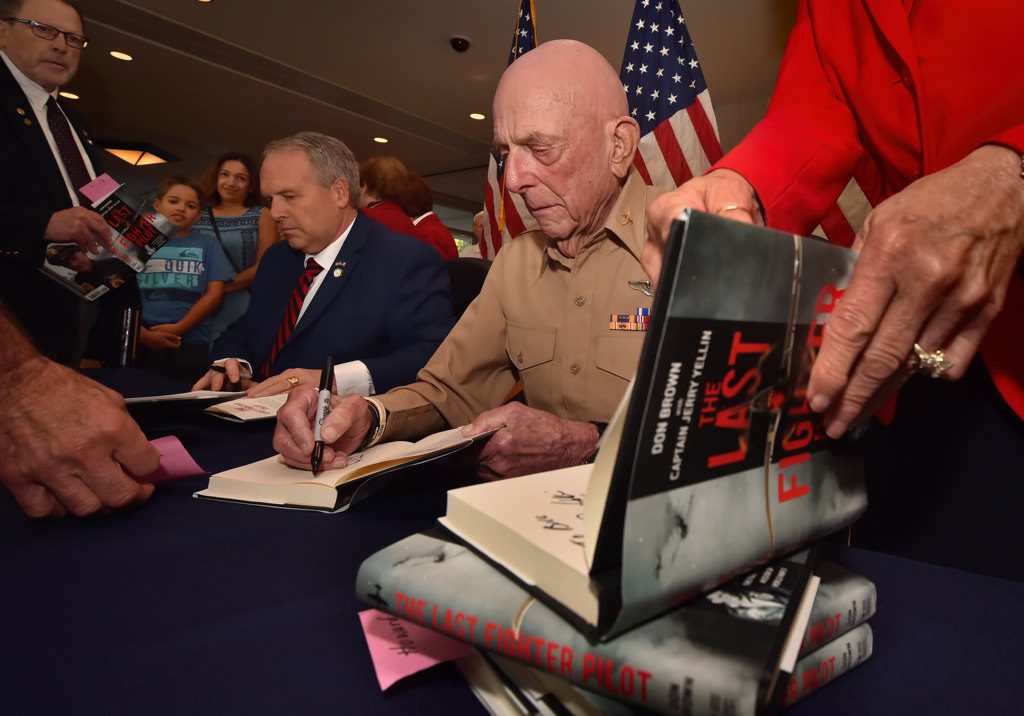
WWII Pilot Capt. Jerry Yellin signs books about him with author Don Brown, left, at the conclusion of a lecture at the Nixon Library.
Photo by Steven Georges/Behind the Badge OC
A year later, Yellin and his wife gave their son Robert, one of their four children, a trip to Japan as a graduation gift.
Robert became enamored with Japan.
So much so that he wound up getting a job teaching English in Japan.
On March 5, 1988, Yellin and his wife returned to Japan again, this time for Robert’s wedding to a Japanese woman, whose father fought for Japan during World War II.
Before the wedding, Yellin met his son’s father-in-law.
The two men talked for three hours.
They learned that their love for family, culture, education and spirituality was the same.
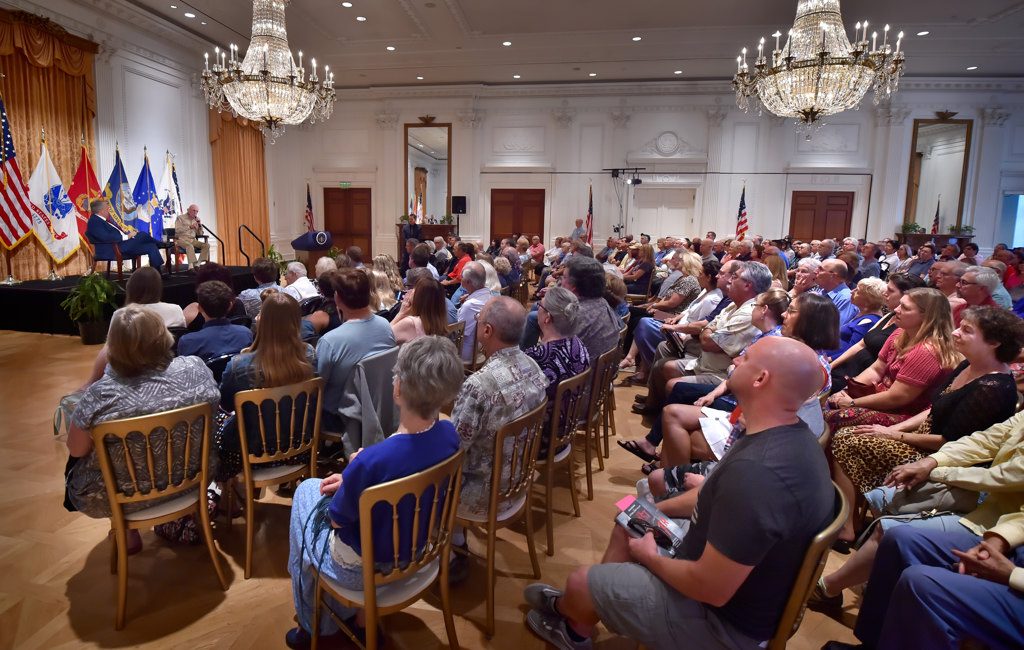
Capt. Jerry Yellin talks to the crowd gathered at the Nixon Library about his experiences flying over Japan during World War II and his life after the war.
Photo by Steven Georges/Behind the Badge OC
“We bonded and we became friends,” Yellin said.
Today, Yellin believes that while a person’s beliefs don’t define them as human beings, he has an opinion on the racism and hatred that is still prevalent.
“People who believe something strongly enough that they are willing to take the life of other people are evil people,” Yellin said. “We are all exactly the same, no matter where we came from. We come in the same way. We go out the same way. We are all human beings.”
 Behind the Badge
Behind the Badge
